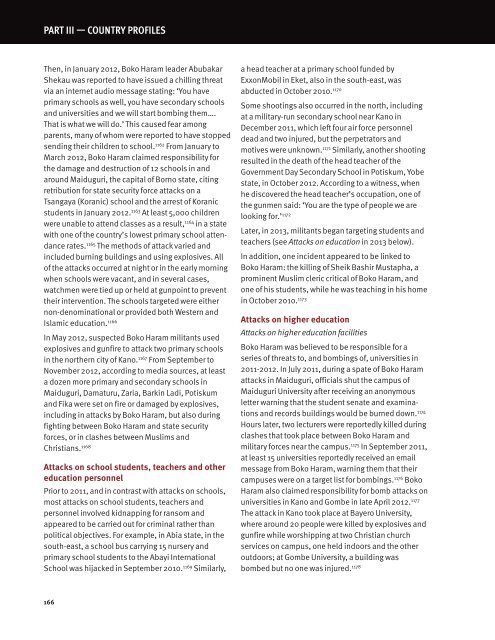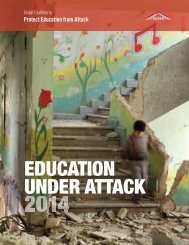You also want an ePaper? Increase the reach of your titles
YUMPU automatically turns print PDFs into web optimized ePapers that Google loves.
PART III — COUNTRY PROFILeS<br />
Then, in January 2012, Boko Haram leader Abubakar<br />
Shekau was reported to have issued a chilling threat<br />
via an internet audio message stating: ‘You have<br />
primary schools as well, you have secondary schools<br />
and universities and we will start bombing them….<br />
That is what we will do.’ This caused fear among<br />
parents, many of whom were reported to have stopped<br />
sending their children to school. 1162 From January to<br />
March 2012, Boko Haram claimed responsibility for<br />
the damage and destruction of 12 schools in and<br />
around Maiduguri, the capital of Borno state, citing<br />
retribution for state security force attacks on a<br />
Tsangaya (Koranic) school and the arrest of Koranic<br />
students in January 2012. 1163 At least 5,000 children<br />
were unable to attend classes as a result, 1164 in a state<br />
with one of the country’s lowest primary school attendance<br />
rates. 1165 The methods of attack varied and<br />
included burning buildings and using explosives. All<br />
of the attacks occurred at night or in the early morning<br />
when schools were vacant, and in several cases,<br />
watchmen were tied up or held at gunpoint to prevent<br />
their intervention. The schools targeted were either<br />
non-denominational or provided both Western and<br />
Islamic education. 1166<br />
In May 2012, suspected Boko Haram militants used<br />
explosives and gunfire to attack two primary schools<br />
in the northern city of Kano. 1167 From September to<br />
November 2012, according to media sources, at least<br />
a dozen more primary and secondary schools in<br />
Maiduguri, Damaturu, Zaria, Barkin Ladi, Potiskum<br />
and Fika were set on fire or damaged by explosives,<br />
including in attacks by Boko Haram, but also during<br />
fighting between Boko Haram and state security<br />
forces, or in clashes between Muslims and<br />
Christians. 1168<br />
Attacks on school students, teachers and other<br />
education personnel<br />
Prior to 2011, and in contrast with attacks on schools,<br />
most attacks on school students, teachers and<br />
personnel involved kidnapping for ransom and<br />
appeared to be carried out for criminal rather than<br />
political objectives. For example, in Abia state, in the<br />
south-east, a school bus carrying 15 nursery and<br />
primary school students to the Abayi International<br />
School was hijacked in September 2010. 1169 Similarly,<br />
a head teacher at a primary school funded by<br />
ExxonMobil in Eket, also in the south-east, was<br />
abducted in October 2010. 1170<br />
Some shootings also occurred in the north, including<br />
at a military-run secondary school near Kano in<br />
December 2011, which left four air force personnel<br />
dead and two injured, but the perpetrators and<br />
motives were unknown. 1171 Similarly, another shooting<br />
resulted in the death of the head teacher of the<br />
Government Day Secondary School in Potiskum, Yobe<br />
state, in October 2012. According to a witness, when<br />
he discovered the head teacher’s occupation, one of<br />
the gunmen said: ‘You are the type of people we are<br />
looking for.’ 1172<br />
Later, in 2013, militants began targeting students and<br />
teachers (see Attacks on education in 2013 below).<br />
In addition, one incident appeared to be linked to<br />
Boko Haram: the killing of Sheik Bashir Mustapha, a<br />
prominent Muslim cleric critical of Boko Haram, and<br />
one of his students, while he was teaching in his home<br />
in October 2010. 1173<br />
Attacks on higher education<br />
Attacks on higher education facilities<br />
Boko Haram was believed to be responsible for a<br />
series of threats to, and bombings of, universities in<br />
2011-2012. In July 2011, during a spate of Boko Haram<br />
attacks in Maiduguri, officials shut the campus of<br />
Maiduguri University after receiving an anonymous<br />
letter warning that the student senate and examinations<br />
and records buildings would be burned down. 1174<br />
Hours later, two lecturers were reportedly killed during<br />
clashes that took place between Boko Haram and<br />
military forces near the campus. 1175 In September 2011,<br />
at least 15 universities reportedly received an email<br />
message from Boko Haram, warning them that their<br />
campuses were on a target list for bombings. 1176 Boko<br />
Haram also claimed responsibility for bomb attacks on<br />
universities in Kano and Gombe in late April 2012. 1177<br />
The attack in Kano took place at Bayero University,<br />
where around 20 people were killed by explosives and<br />
gunfire while worshipping at two Christian church<br />
services on campus, one held indoors and the other<br />
outdoors; at Gombe University, a building was<br />
bombed but no one was injured. 1178<br />
166



